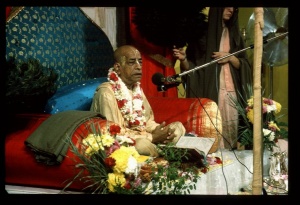CC Adi 17.85 (1975): Difference between revisions
(Vanibot #0027: CCMirror - Mirror CC's 1996 edition to form a basis for 1975) |
(Vanibot #0020: VersionCompareLinker - added a link to the Version Compare feature) |
||
| Line 2: | Line 2: | ||
<div style="float:left">'''[[Sri Caitanya-caritamrta (1975)|Śrī Caitanya-caritāmṛta (1975)]] - [[CC Adi (1975)|Ādi-līlā]] - [[CC Adi 17 (1975)|Chapter 17: The Pastimes of Lord Caitanya Mahāprabhu in His Youth]]'''</div> | <div style="float:left">'''[[Sri Caitanya-caritamrta (1975)|Śrī Caitanya-caritāmṛta (1975)]] - [[CC Adi (1975)|Ādi-līlā]] - [[CC Adi 17 (1975)|Chapter 17: The Pastimes of Lord Caitanya Mahāprabhu in His Youth]]'''</div> | ||
<div style="float:right">[[File:Go-previous.png|link=CC Adi 17.84 (1975)|Ādi-līlā 17.84]] '''[[CC Adi 17.84 (1975)|Ādi-līlā 17.84]] - [[CC Adi 17.86 (1975)|Ādi-līlā 17.86]]''' [[File:Go-next.png|link=CC Adi 17.86 (1975)|Ādi-līlā 17.86]]</div> | <div style="float:right">[[File:Go-previous.png|link=CC Adi 17.84 (1975)|Ādi-līlā 17.84]] '''[[CC Adi 17.84 (1975)|Ādi-līlā 17.84]] - [[CC Adi 17.86 (1975)|Ādi-līlā 17.86]]''' [[File:Go-next.png|link=CC Adi 17.86 (1975)|Ādi-līlā 17.86]]</div> | ||
{{CompareVersions|CC|Adi 17.85|CC 1975|CC 1996}} | |||
{{RandomImage}} | {{RandomImage}} | ||
==== TEXT 85 ==== | ==== TEXT 85 ==== | ||
<div class="verse"> | <div class="verse"> | ||
:aṣṭhi-valkala nāhi, | :aṣṭhi-valkala nāhi,--amṛta-rasamaya | ||
:eka phala khāile rase udara pūraya | :eka phala khāile rase udara pūraya | ||
</div> | </div> | ||
Latest revision as of 16:47, 26 January 2020
Śrī Caitanya-caritāmṛta (1975) - Ādi-līlā - Chapter 17: The Pastimes of Lord Caitanya Mahāprabhu in His Youth

His Divine Grace
A.C. Bhaktivedanta Swami Prabhupada
A.C. Bhaktivedanta Swami Prabhupada
TEXT 85
- aṣṭhi-valkala nāhi,--amṛta-rasamaya
- eka phala khāile rase udara pūraya
SYNONYMS
aṣṭhi—seed; valkala—skin; nāhi—there is none; amṛta—nectar; rasa-maya—full of juice; eka—one; phala—fruit; khāile—if one eats; rase—with the juice; udara—belly; pūraya—fulfilled.
TRANSLATION
The fruits had no seeds or skins. They were full of nectarean juice and were so sweet that a man would be fully satisfied by eating only one.